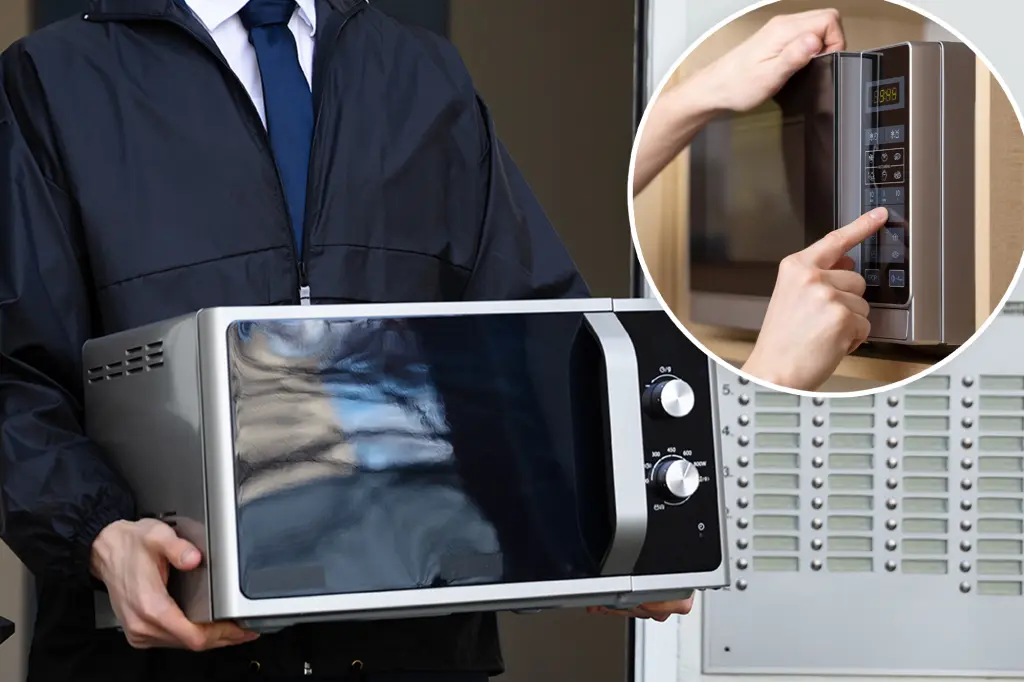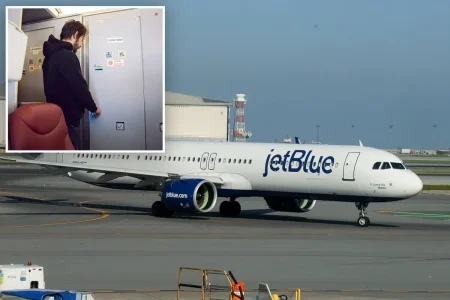When Office Microwaves Become Battlegrounds: A Tale of Workplace Drama
In every workplace, the breakroom should be a sanctuary—a place where colleagues can briefly escape the demands of their jobs, enjoy a meal, or simply recharge with a cup of coffee. However, for one shuttle driver, this communal space became the stage for an unexpected drama centered around something seemingly mundane: a microwave. After watching company microwaves repeatedly break down under the heavy use of approximately 20 drivers sharing lunch breaks, this resourceful employee decided to take matters into his own hands. Not only did he purchase his own microwave to bring to work, but he also installed a lock on it—a decision that prompted him to seek moral validation on Reddit’s r/AITA forum, wondering if his actions crossed a line of workplace etiquette.
The situation had been building for some time. According to the driver’s post, the company’s approach to breakroom appliances was frustratingly inadequate. “They broke the new one in a day,” he explained, referring to his colleagues’ rough handling of the most recent company microwave. Management’s solution wasn’t particularly helpful: they banned drivers from using the microwave in the Dispatch office and refused to purchase a replacement until the current one broke down completely. This left approximately 20 drivers sharing a single, overworked appliance—a recipe for inevitable breakdown and subsequent lunchtime chaos. Before taking drastic measures, the poster had attempted a collaborative solution, asking his colleagues if they would contribute to purchasing a shared microwave. To his disappointment, they declined, unwilling to invest their own money in a communal appliance.
Faced with this rejection, the driver purchased his own microwave but didn’t stop there—he secured it with a lock. His reasoning was straightforward: since no one else would contribute financially to a new appliance, he didn’t want his personal investment to suffer the same fate as the company microwaves through excessive use. “I didn’t want the new appliance to break down by overuse,” he explained, “especially since no one wanted to throw money towards a new one.” This protective measure, while practical from his perspective, created an uncomfortable dynamic in the breakroom. Rather than resolving the issue, his solution highlighted the underlying problems of resource sharing and collective responsibility in the workplace, turning a simple appliance into a symbol of workplace politics.
Reddit commenters largely supported the driver’s actions while acknowledging the social consequences he might face. “NTA technically, but this might not be the hill to die on as your coworkers are going to think you’re an ass,” warned one responder, succinctly capturing the tension between being technically right and maintaining workplace harmony. Another commenter put it more bluntly: “NTA you just have broke lazy coworkers. That’s it.” A third offered validation along with a prediction: “NTA they are going to be mad but you offered for them to chip in and no one agreed. I’m sure they are gonna be salty but it is what it is.” The consensus seemed to be that while the driver had every right to protect his property, the locked microwave would almost certainly create tension among colleagues who might view it as unnecessarily territorial or petty.
This microwave drama represents just one manifestation of workplace friction that can arise from shared resources and differing expectations about communal responsibilities. While some workers find themselves embroiled in appliance disputes, others contend with different yet equally frustrating workplace dynamics, such as the dreaded “pointless meeting.” Research published in the Harvard Business Review has identified a phenomenon known as “meeting hangovers”—the lingering negative effects that unproductive meetings have on employee morale and productivity. As Steven Rogelberg, a professor at UNC Charlotte and author of “The Surprising Science of Meetings,” explained to CBS News, “A meeting hangover is the idea that when we have a bad meeting, we just don’t leave it at the door. It sticks with us and it negatively affects our productivity.”
At its core, this story about a locked microwave reflects broader themes in workplace culture: the tension between individual and collective responsibility, the challenges of equitable resource sharing, and how seemingly trivial matters can become symbolic battlegrounds for deeper workplace issues. The shuttle driver’s dilemma—whether to share his microwave freely and risk its premature demise or protect his investment at the cost of colleague relationships—represents a microcosm of workplace dynamics that many can recognize. While there’s no perfect solution to such situations, they remind us that workplaces are complex social environments where practical concerns and interpersonal relationships constantly intersect and sometimes collide. Whether it’s a locked microwave or an unnecessary meeting, these friction points reveal the delicate balance required to maintain both functional systems and positive workplace relationships—a balance that remains elusive in many professional settings.














